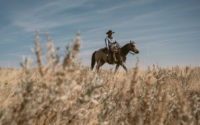Bon Iver’s “AWARDS SEASON”
Fall is such a poetic reminder of life’s precious truth—namely, that it will end—so it felt like a spark of cosmic timing that Bon Iver‘s three-song EP SABLE dropped in those tawny days of cascading leaves last year. The album was short even by EP standards and especially considering that it’d been five years since i, i. But it marked a novel turn for Justin Vernon. The singer-songwriter shed his proclivity for abstract lyricism, daring instead for plainspoken confession.
I connected most with one lyrical ray bursting forth from the final track “AWARDS SEASON,” which feels practically naked when you consider that Vernon once said he sang in falsetto to more easily access painful memories. Against a murmuring hum of a synth, a void if there ever was one, Vernon sings a cappella in his chest voice and proclaims a gospel of time.
“Oh, how everything can change/ In such a small timeframe/ You can be remade/ You can live again./ What was pain now’s gained/ A new path gets laid/ And you know what is great?/ Nothing stays the same,” he sings from a place of hard-won perspective, his firewood baritone delivering line after line of barreling revelation.
Any couplet would be enough, a nugget offering solace on gloomier days, but the sheer volume of them careen toward a loaded epiphany. “You know what is great?” Vernon sings, his cadence following along with the meter as if he were soft-shoeing it down a flight of stairs. “Nothing stays the same.”
In the context of the song, Vernon’s discovery emerges from an unexpected romantic connection. He awakens to its tender surprise after a period of bleak dormancy and suddenly everything has changed. But in the context of my life, I heard a much-needed and little-heeded reminder: that change is stitched up in the fabric of existence, making the endeavor of witnessing, acknowledging, and accepting it a worthy one.
The last line recalled a conversation I had with my aunt when I still lived in Toronto. “Nothing ever lasts,” I bemoaned at the time. She said that was too finite a stance. My grandmother would instead say, “Nothing stays the same,” nodding to the certainty that situations—both good and bad—evolve.
Listening to “AWARDS SEASON,” here was that nudge once more. Each moment, whether exhilarating or defeating, is a season. If you can relinquish your hold over it, trying not to cling to the good or flee the bad, then you will, I believe, have succeeded in “confronting with passion the conundrum of life,” as James Baldwin so beautifully wrote in his penetrating 1962 essay “Letter from a Region in My Mind.”
Because that’s the trick to life: You have to acknowledge its counterpart death. Surrending your hold over any one moment means surrending your hold over all moments. Yet, despite the intrinsic ephemerality woven into our time here, so many of us spend our lives avoiding or outright ignoring the endpoint. That life ceases is the one guarantee, what Baldwin called “reality.” His lengthy point is here worth quoting in full.
“Life is tragic simply because the earth turns and the sun inexorably rises and sets, and one day, for each of us, the sun will go down for the last, last time. Perhaps the whole root of our trouble, the human trouble, is that we will sacrifice all the beauty of our lives, will imprison ourselves in totems, taboos, crosses, blood sacrifices, steeples, mosques, races, armies, flags, nations, in order to deny the fact of death, which is the only fact we have. It seems to be that one ought to rejoice in the fact of death—ought to decide, indeed, to earn one’s death by confronting with passion the conundrum of life. One is responsible to life: It is the small beacon in that terrifying darkness from which we come and to which we shall return.”
The fact of death engenders a greater responsibility to life. At least, that’s the vantage I’ve reached. It doesn’t need to be the morbid, unseemly thing Americans tend to make of it. Rather than hide in choices that keep such finality at a distance, there’s a larger beauty to be earned from this time on earth if you’re willing, in every choice you make, to accept that life is but one season made up of many. And seasons end. Because of long covid, I live each day now with that knowledge and I’m oddly grateful for it.
“AWARDS SEASON” builds to that moment musically. After Vernon’s newfound exuberance plummets because his partner decides to break off the relationship (“You said that you were unable/ That it’s not reprieved”), the song explodes in a bounty of sax. You hear it: The frustration in ceding control to something you want so badly alongside the beauty of letting go. That’s the conundrum of life. And it’s what I will spend my days striving to face.



